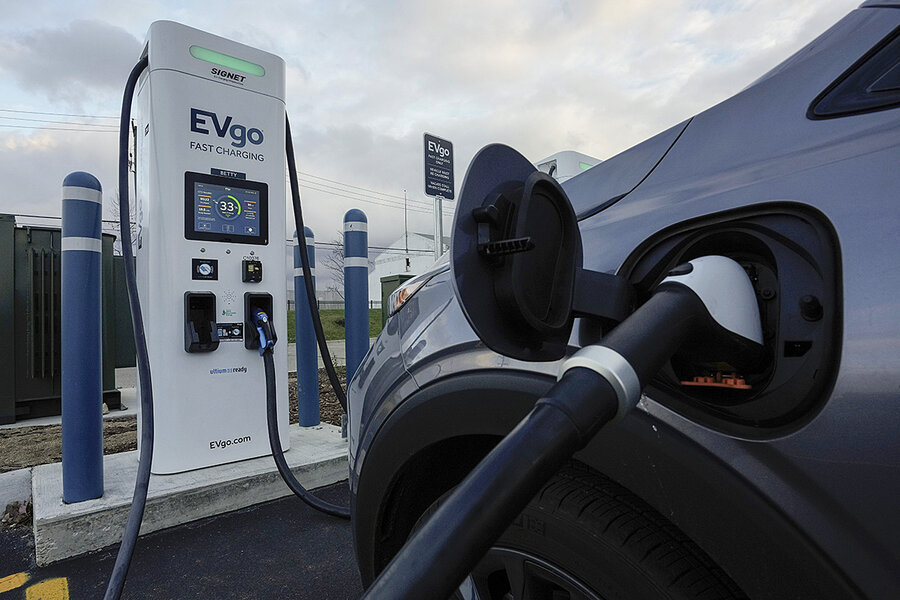The Approaching Reality of All-Electric-Vehicles
"[I'm standing up for a] silent majority [in the auto industry that] is wondering whether EVs are really OK to have as a single option [for car buyers].""Certain groups seek to use the name of the environment but what I'm preaching is based on the reality of users in a number of markets."Akio Toyoda, President, Toyota Motors"If this … EV market share requirement is implemented, within the proposed time frame, it will impact every aspect of the auto industry in the form of lost jobs and dramatic price hikes for both EVs and gasoline models.""These increases will either drive the price of new vehicles beyond the average American’s budget or put multiple global automakers in financial peril. Likely both, in that order."Karl Brauer, executive analyst, iSeeCars, Boston area car-search website
 |
| An Electrify America Charging Station for vehicles is seen at Westfield Old Orchard shopping center in Skokie, Illinois, Jan. 29, 2023. Consumer concerns about electric vehicles include reduced driving range in cold weather. Nam Y. Huh/AP |
Polls in the U.S. and Canada suggest concerns relating to range anxiety and doubts with respect to limited charging infrastructure and the capacity of the electricity grid to deliver a massive transformation are genuine. Including concerns surrounding affordability of EVs, 'green' subsidies aside. Attitudes expressed negatively on EVs in Canada are more so than in the United States, with its absence of carbon tax.
Companies such as Honda and General Motors have gone so far as to set dates for the time their lineups will represent EV exclusively; similarly, governments in Canada and the United States have set their own arbitrary dates for like action; the latter informing the former. Toyota's president, grandson of the founder of the company, has a preference for his company to offer a variety of environmentally friendly, hybrid-electric and hydrogen-powered vehicles as well as traditional gas-powered automobiles.
His plan is to serve clients in world regions where charging infrastructure is inadequate and where electricity is generated by carbon-emitting fossil fuels. For Mr. Toyoda his recognized reality runs against the messages clamoured by climate evangelists. His expressed market opinion attracted attacks from regulators, environmental groups and shareholders in Scandinavia, New York and California.
The reaction to his unacceptable market-client-oriented take on EVs and still-conventional vehicles was that several American and European ESG-induced funds made an effort to remove Toyoda from his board seat, citing governance issues and the role he played in preventing Toyota from exclusively accepting electric vehicle production. The response was retention of his seat of authority with an 85 percent majority.
Akio Toyoda faced a "one-size-fits-all" bureaucratic mentality when he assumed leadership in 2009 of the family business. He made his mark expeditiously by adapting production to variant regional needs, including an affordable truck for emerging markets; expanding Toyota's global footprint which turned the company back to profit soon afterward. Toyota has grown consistently since then to the point of becoming the world's largest automaker through vehicle sales.
Now chairman, Mr. Toyoda's decision to moderate the company away from an exclusive focus on EV production presents as an example of compelling common sense. While not abandoning EV production, Toyota recently claimed its intention to produce a solid-state battery with a 1,200-kilometre range, able to charge in ten minutes or less; a major game-changer, addressing serious reservations with respect to current EV models.
J.D. Power in March found that 21 percent of new vehicle shoppers in the United States to be "very unlikely" to consider n EV purchase, up from 18.9 percent the month before. About 26.9 percent stated themselves to be "very likely" to consider an EV purchase. In Canada, a similar J.D. Power survey revealed a majority (66 percent) were either "very unlikely" or "somewhat unlikely" to consider an EV purchase, up from 53 percent in 2022.
According to Gallup, public sentiment in the U.S. is sharply split, with 43 percent saying they "might consider" buying an EV in the future; 41 percent unequivocally saying they "would not". Only four percent of Americans own an EV, while 21 percent are "seriously considering" a purchase. Unmentioned for the most part in the EV debate is the threat posed to the environment by EVs powered by liquid-state, lithium-ion batteries; as well the extent to which any charging facilities are powered by fossil fuels.
 |
| Rivian Automotive's electric vehicle factory in Normal, Illinois. Reuters |
Since EV assembly requires 30 to 40 percent less labour, North American autoworker unions worry about a loss of employment. The negative effect of the EV transition on auto parts manufacturers is yet another troubling issue politically. The largest lobbying organization in the U.S., the Alliance for Automotive Innovation, is openly challenging the Biden administration's proposal requiring two-thirds of new passenger vehicles sold be "all electric" by 2032. The goal "cannot be met without substantially increasing the cost of vehicles and reducing customer choice".
As companies flood the American market with bloated inventories of EVs, buyers remain wary, according to Axios, with supply running well ahead of demand. Long-haul truck operators and farm equipment users are being threatened with arbitrary and unrealistic standards for electrification by California and eight other states that would increase transportation costs and disrupt transportation of food, clothing and other necessities across the U.S.
 |
| Associated Press |
Labels: Canada, Conventional Gas-Powered Vehicles, Electric Vehicles, EV-Mandates, United States
0 Comments:
Post a Comment
<< Home